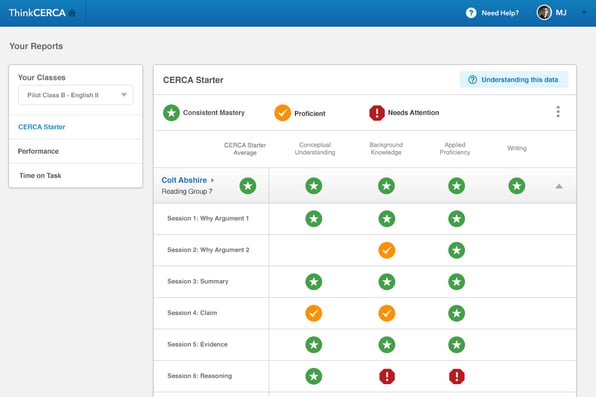
Understanding CERCA Starter Insights
Over the next few days, we'll be rolling out CERCA Starter Reports in your Insight dashboard. These reports are designed to give teachers baseline literacy comprehension data to assess students' current reading levels. With each 30-minute CERCA Starter lesson, educators will have access to real-time data on how their students are performing on key literacy skills and concepts.
To get the most out of these reports, we've compiled a quick guide for understanding the data to better personalize your students' literacy instruction. You can also join us for a free webinar on Getting the Most Out of CERCA Starter on Wednesday, September 23rd at 1 p.m. CT / 2 p.m. ET.
Haven't tried CERCA Starter yet? Get started here >>
Accessing CERCA Starter Reports
Head to your Insight dashboard and click CERCA Starter from the navigation menu on the left (just above Performance and Time on Task). Then, select the class you want to view from the dropdown menu. Next to each student’s name, you will see a roll-up of their scores for all CERCA Starter lessons completed so far. Click the gray arrow on the right to open up a breakout of the scores on each individual lesson.
Conceptual Understanding
The Conceptual Understanding score comes from the Minilesson assessment. These scores indicate a student’s level of understanding of the foundational CERCA concepts. If a student is marked as Needs Attention on any of these concepts, we recommend:
- Working one-on-one with student to ensure understanding.
- FOR SUBSCRIBING USERS: Assigning the full Minilesson about this concept to the
student to reteach it with more examples.
The Background Knowledge and Applied Proficiency scores come from the QuickCERCA assessment. We have broken out Background Knowledge and Applied Proficiency to help you better analyze your students’ abilities.
Background Knowledge
These scores indicate a student’s level of familiarity with the background knowledge needed to understand this text. If a student is marked as Needs Attention on these questions, it may indicate that the student has a low level of background knowledge about this topic. Keep that in mind when analyzing the student’s performance on the CERCA skill questions. In general, the more background knowledge a student has about a text, the more successful that student will be in comprehending the text. If a student has a low background knowledge score and a low applied proficiency score, the issue may be with background knowledge rather than application of the skill. If a student has a high background knowledge score but a low applied proficiency score, provide additional support to help the student learn to apply the skill.
- FOR SUBSCRIBING USERS: Help your students build background knowledge before working on
Applied Lessons by using our curated resources at www.pinterest.com/thinkcerca.
Applied Proficiency
These scores indicate a student’s level of proficiency in applying the foundational CERCA skills. If a student is marked as Needs Attention on any of these skills, analyze the items the student has missed to see if Conceptual Understanding or low Background Knowledge had an impact on the student’s ability to apply the skill. If the student had an issue applying the skill, we recommend:
- Working one-on-one with student to ensure understanding.
- Using this data, along with all other observations and data about the student, to determine if the student would be more successful in the next lower reading level for the following session. Use this recommendation after at least two completed Sessions.
- FOR SUBSCRIBING USERS: Assigning the full Minilesson about this skill to the student to reteach skill with more examples.
- FOR SUBSCRIBING USERS: Using this skill as the student’s growth focus as they start applying the skill in Applied Lessons. You may also wish to have the student use the additional supports within the Applied Lessons (audio, vocabulary, academic language stems, and so on).
Continue to monitor student progress throughout the CERCA Starter to place your students at a reading level that will challenge them appropriately.

Elizabeth Riley Boyer is an experienced journalist, digital content strategist, and operations manager. Prior to joining ThinkCERCA, she was part of the founding team at Impact Engine, Chicago’s first social impact investment fund and accelerator. As Impact Engine’s Director of Operations & Communications, Elizabeth oversaw the company’s overall processes, day-to-day planning and finances, curriculum development, marketing strategy, and community outreach.
Elizabeth also spent three years at Chicago magazine, most recently as its Digital Engagement Editor, where she managed the organization’s social media and reader engagement initiatives. Elizabeth also works as a freelance content strategist, writer, and communications consultant. Her recent writings on impact entrepreneurship have been featured by the Huffington Post and Crain’s Chicago Business.
In 2007, Elizabeth helped open a private school for underprivileged children while volunteering for a nonprofit organization in the Dominican Republic. This experience inspired her to quit a paper-pushing job at an insurance brokerage firm to pursue a master’s degree in journalism from Northwestern University. Elizabeth also holds a bachelor’s degree in American studies from the University of Texas at Austin.
